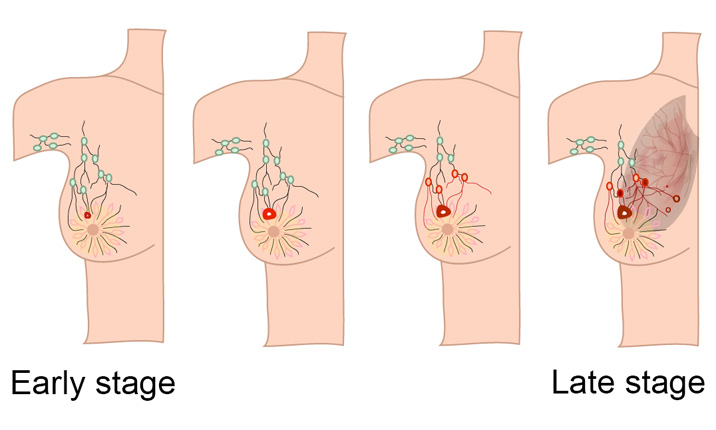Breast cancer is on the rise, both in rural and urban India. It is reported that with every four minutes, an Indian woman is diagnosed with breast cancer. One in twenty-eight Indian women is likely to develop breast cancer during her lifetime. It is more (1 in 22) for urban women than the rural group (1 in 60). So being aware of the breast cancer is the need of the hour.
Hence on the occasion of Breast Cancer Awareness Month being observed during the month of October, Let us revisit lifestyle related risk factors associated with Breast Cancer.
Lifestyle-related Breast Cancer Risk Factors
A risk factor is anything that increases your chances of getting a particular disease. According to various studies, certain breast cancer risk factors are related to personal behaviours, such as diet and exercise. Other lifestyle-related risk factors include age at which women opt for having the first child and taking medicines that contain hormones. It is believed that modifying these risk factors and cultivating healthier practices may lower the chance of getting the breast cancer.
Here are some of life style risk factors that one need to understand and change…..
Obesity
Being overweight or obese increases the risk of having breast cancer. Fat tissue produces higher amounts of estrogen which can increase the breast cancer risk in women with high BMI. Also, women who are overweight tend to have higher blood insulin levels. Higher insulin levels have been linked to breast cancer.
Obesity is especially linked to an increased risk of breast cancer in postmenopausal women as after menopause most of a woman’s oestrogen comes from fat tissue (before menopause, ovaries make most of the oestrogen)
Research shows that aiming to lose as small as 5% to 10% of your body weight through changes in diet and physical activity can be the first step in achieving your ideal BMI and benefits your overall well-being and health.
Sedentary lifestyle
Evidence is growing that regular physical activity reduces breast cancer risk, especially in women past menopause. The main question is how much activity is needed. Exactly how physical activity might reduce breast cancer risk isn’t clear, but it may be due to its effects on body weight, inflammation, hormones, and energy balance. Experts recommend that adults get 150 to 300 minutes of moderate intensity or 75 to 150 minutes of vigorous intensity activity each week (or a combination of these). Ramping up your exercise routine even more may further reduce your breast cancer risk.
Age at first child birth and number of births
Women who have not had children or who had their first child after age 30 have a slightly higher breast cancer risk overall. Having many pregnancies and becoming pregnant at an early age reduces breast cancer risk. Your first full-term pregnancy makes the breast cells fully mature and grow in a more regular way. This is how pregnancy gives protection against breast cancer. Being pregnant also reduces your total number of lifetime menstrual cycles, in turn lesser exposure to harmones, which may offer a protective effect.
Still, the effect of pregnancy on breast cancer risk is complex. For example, the risk of breast cancer is higher for about the first decade after having a child, particularly for hormone receptor-negative breast cancer (including the less common triple-negative breast cancer). The risk then becomes lower over time.
Breastfeeding
Most studies suggest that breastfeeding may slightly lower breast cancer risk, especially if it’s continued for a year or more. This can be due to the fact that breastfeeding reduces a woman’s total number of lifetime menstrual cycles. Each year of breast feeding practice reduces the breast cancer risk by almost 4.3%.
Usage of certain birth control measures
Some birth control methods like pills use hormones, which might slightly increase breast cancer risk. It depends upon type of formulation used and duration of usage. Once the pills are stopped, this risk seems to go back to normal within about 10 years.
Harmone replacement therapy
HRT using a combination of estrogen and progestin may increase the risk of breast cancer. For women who have had a hysterectomy (removal of uterus), taking HRT that only includes estrogen may be a better option. Estrogen alone does not increase breast cancer risk. However, women who still have a uterus are at increased risk of endometrial cancer from estrogen only HRT.
Talk with your doctor about all the options to control your menopausal symptoms, including the risks and benefits of each. If you decide to go for HRT, it is better to use it at the lowest dose that works for you and for shortest time as possible. The good news is that within 3 years of stopping the HRT, the risk returns to that of a woman who has never used HRT.
Along with the above, it is also understood that usage of Breast Implants is now being linked to some rare type of Breast Cancers.
Drinking alcohol
Drinking alcohol is also linked to an increased risk of breast cancer. The risk increases with the amount of alcohol consumed. Women who have 1 alcoholic drink a day have a small (about 7% to 10%) increase in risk compared with non-drinkers, while women who have 2 to 3 drinks a day have a further higher risk. It is best to avoid alcohol. For women who do drink, they should have no more than 1 drink a day.
Take Home the Message
There is no harm in welcoming these changes even if they won’t bring good and reduce the risk but it is sure that they won’t even do harm. Whenever life is difficult, it is both harder and more important to care for oneself. Lifestyle change is not a written prescription that never changes. It is a dynamic process. The first and biggest step is to care enough about yourself to pursue what you need. This is self-care. Lifestyle change begins with a personal commitment to feel and be healthier. Let’s start moving in this direction.
———————————————————————————————————————————-

The article is prepared by Dr. V Padmini Silpa, MBBS, DGO, DNB-Obstetrics & Gynaecology; Consultant Gynaecologist, Obstetrician, Apollo Cradle & Children’s Hospital, Kondapur, Hyderabad







Comment here